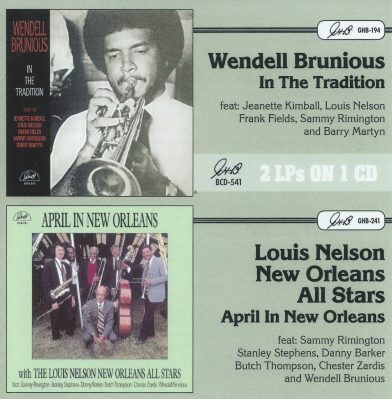 For reissue purposes, these two albums, trumpeter/vocalist Wendell Brunious’ In the Tradition (recorded in 1986) and trombonist Louis Nelson’s April in New Orleans (recorded in 1988) were joined together on one 18-cut CD. They marry well, with the leaders playing in each other’s bands that also including British clarinetist Sammy Rimington. The repertoires on each span—with a couple of exceptions—from the 1920s to the 1950s are highly compatible and both albums share the blessing of a high-quality recording.
For reissue purposes, these two albums, trumpeter/vocalist Wendell Brunious’ In the Tradition (recorded in 1986) and trombonist Louis Nelson’s April in New Orleans (recorded in 1988) were joined together on one 18-cut CD. They marry well, with the leaders playing in each other’s bands that also including British clarinetist Sammy Rimington. The repertoires on each span—with a couple of exceptions—from the 1920s to the 1950s are highly compatible and both albums share the blessing of a high-quality recording.
Naturally, with Brunious as leader, there are many more vocal numbers on his portion of the disc. The album opens instrumentally with a go-to classic, “Bugle Boy March,” one of several marches, which at first sounds, well, dated—until the members start swinging and improvising. Pianist Jeanette Kimball is simply explosive here. The rhythm section also includes bassist Frank Fields and drummer Barry Martyn.
An interesting choice on the program is the country favorite “Blue Eyes Crying in the Rain,” which was first recorded by Roy Acuff with Willie Nelson making it a big hit in 1975. Brunious vocally retains its country and western flavor.
Clarence Williams’ slinky “Sugar Blues” from the 1920s stands as a good vehicle for Brunious’ muted trumpet. It’s time to dance on “Wang Wang Blues,” from the same era.
Some songs just, as they say, “have legs,” meaning they enjoy lasting power. Several such tunes show up on Louis Nelson’s second half of the disc. For instance, “I’m Sorry I Made You Cry,” which was written in 1918, has been recorded by such stellar and diverse artists as Fats Waller, Frank Sinatra and Connie Francis. It’s a lively number, as is another tune “with legs,” “Bill Bailey” featuring vocalist and banjoist Danny Barker. Barker, who offers fine rhythm throughout this section of the disc, humorously adds his own touch to the lyrics: “This is how they sing it in the projects…”
Nelson’s primary work is within the ensemble that includes pianist Butch Thompson, bassist Chester Zardis and drummer Stanley Stephens. He does step out front for a solo on the waltz-time version of 1924’s “Carolina Moon.”
The music appropriately returns home for a classic jazz number, native son Spencer Williams’ 1929 “Mahogany Hall Stomp.” Everybody’s in on the fun of soloing on this traditional number that jumps in recognition of the nefarious Basin Street brothel. That’s the way to take it out.




